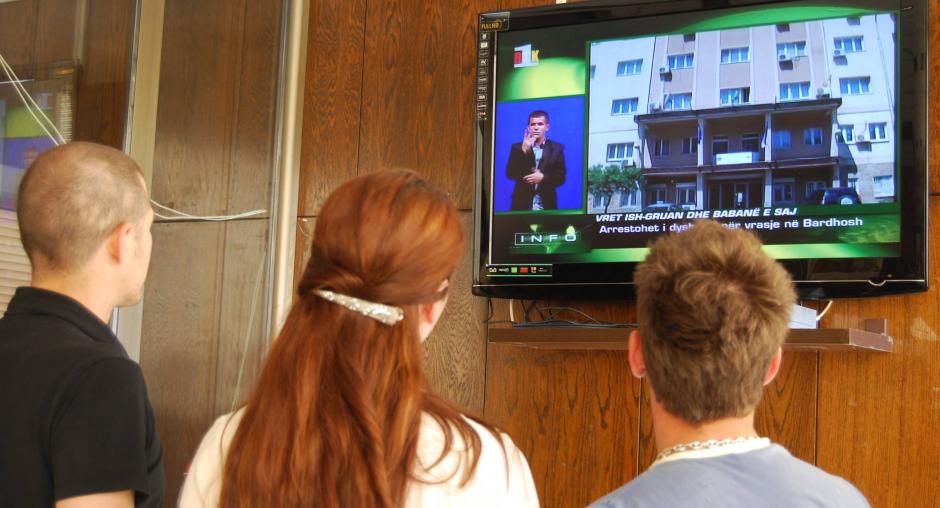OSCE Mission helps Kosovo's RTK improve non-majority language programming
At 6:00 pm every evening, Kosovo's public broadcaster RTK starts its non-majority language programming, with news and other stories of interest for the respective communities. Apart from its main programme in Albanian, RTK broadcasts a 15-minute news bulletin every evening in Serbian, Bosnian and Turkish, as well as an hour-long weekly programme in the Romani language.
However, according to community members, research by the OSCE Mission in Kosovo, and RTK itself, the community language programming was weak in content and lacked information from the regions where the non-majority communities live. As a consequence, it was less watched than the Albanian broadcasts.
"The RTK programme in Serbian was quite poor," says Igor Savic, a resident of Strpce/Shtërpcë, a town with a majority Kosovo Serb population in southern Kosovo. "All the information we would get was about high-level politics - what Prishtinë/Pristina and Belgrade said," he adds.
In an effort to change this, the OSCE Mission has developed a six-month long project, which began in mid-May and involves direct co-operation with local TV stations and independent production companies operating in various regions and languages of Kosovo.
More information from the regions
"The idea was to improve the community programming by increasing the flow of information from the regions through TV reports produced by local media, which have already shown a commitment to their audiences and journalism," says Arben Hajredinaj, project officer in the Mission's media unit.
Local TV stations have now been feeding RTK with stories from their respective regions for almost two months and, as the public broadcaster's deputy director Anamari Repic explains, the stories have been shown on RTK in all languages, and have been well received.
"We have an agreement with three local Serb TV stations and one Serb independent news production company, one TV station for Bosnian and one for Turkish, and we have an NGO producing stories for the TV programme in the Romani language," says Repic, adding: "This method of co-operation enables local voices to be heard not just at the local level, but also at the Kosovo level."
Greater viewer interest
"We have viewers among Serbs who are more and more interested in what's happening in their local areas. Moreover, our viewers can now see reports from northern Kosovo owing to our co-operation with TV Mir from Leposavic/Leposaviq, which was lacking in the past," Repic notes.
Igor Savic in Strpce/Shtërpcë agrees: "The programme now has more information from the field on what certain issues mean to students or parents. It's definitively richer with more real voices and pictures, not just an anchor reading the news."
Other non-majority language programmes are equally successful. RTK's Repic highlights the Roma programme as particularly important: "We have the possibility now to have more stories on education, which is specifically important for them."
Increased local-level professionalism
In addition to showing communities how their fellow citizens in different regions live, the project will also help local TV stations in the regions become more professional. "A wider audience means more responsibility," says the OSCE's Hajredinaj.
The Director of TV Herc in Strpce/Shtërpcë, Bojan Mladenovic, adds that it is important that the local RTK news is no longer just a translation of the Albanian programme. "We bring authentic stories on issues directly affecting community members," he says.
At the same time, Mladenovic points out that the project also helps the station improve its quality: "Journalists try harder and better quality brings more viewers. People notice our reports on RTK and ask 'How come?'"
RTK's Repic confirms the change: "I see more and more Serb politicians, representatives from civil society and citizens who want to give interviews and contribute to debates on the Serbian programme," she says, adding that she hopes for continued co-operation once the project concludes at the end of the year.
"It will depend on the budget, but it's not the decisive element. If local TV stations are professional and serious - and I see they are - we will continue beyond November because it is important for us and for the citizens."

